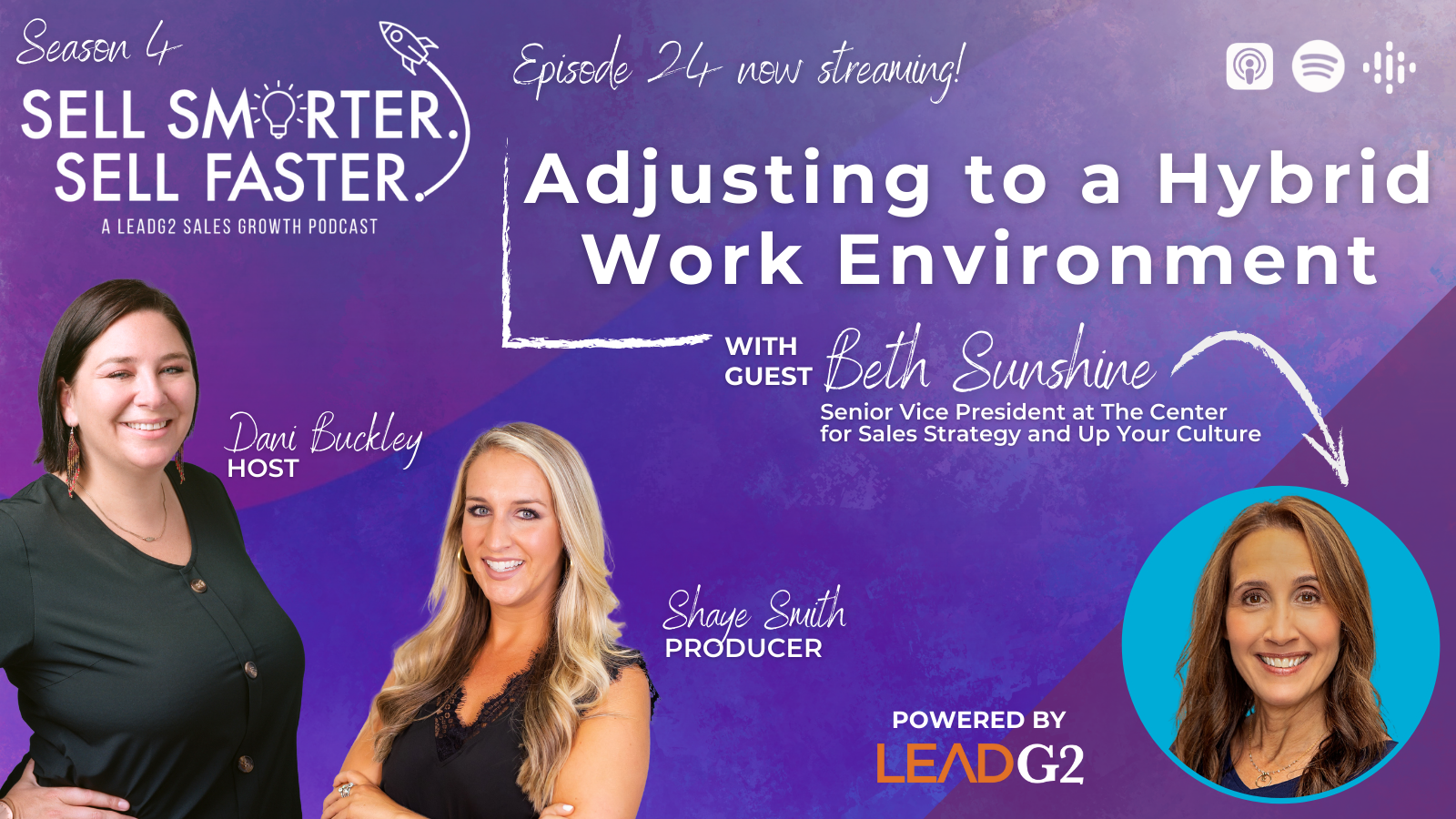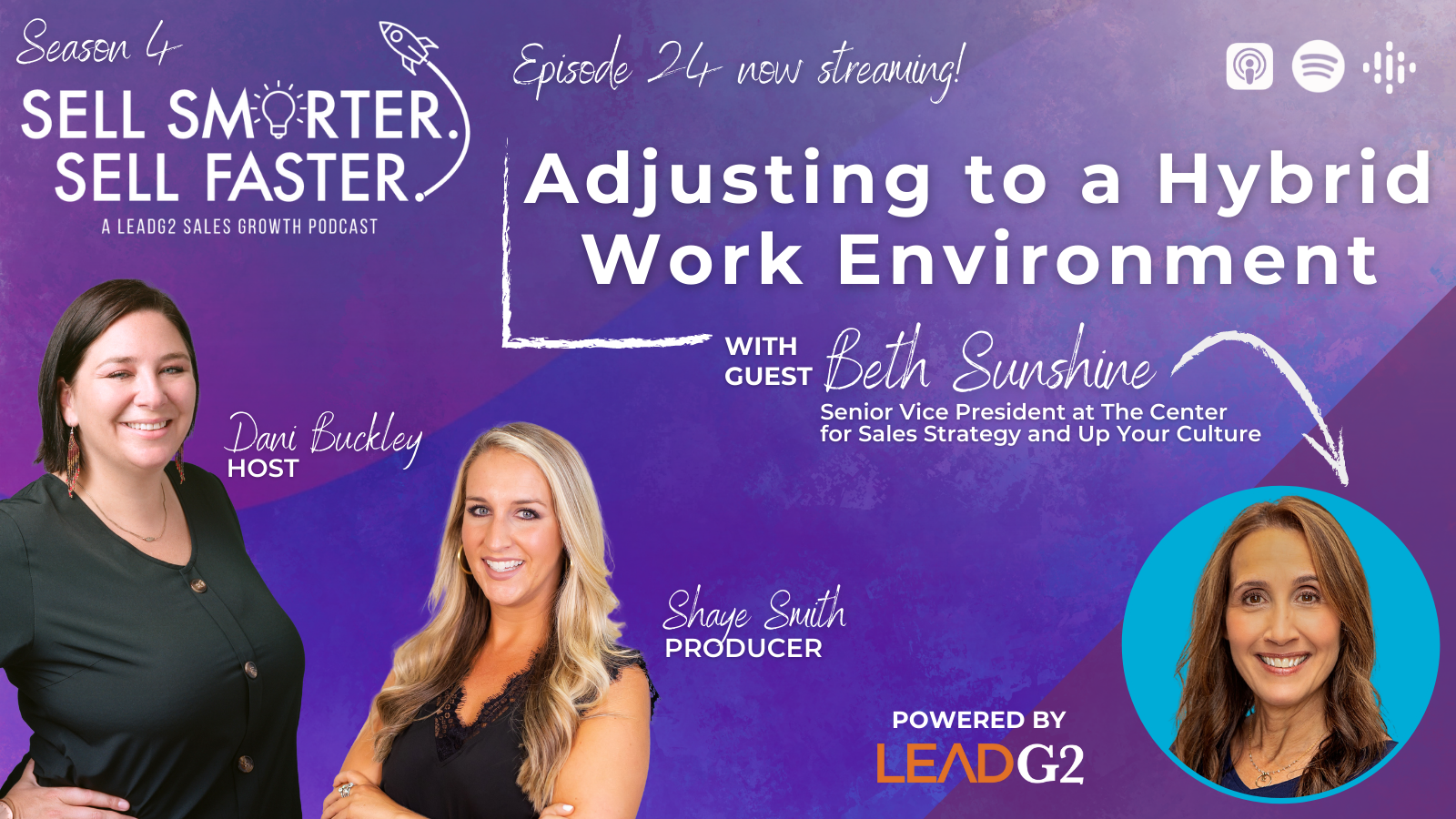1 min read
How SEO Really Works (In Simple Terms)
SEO isn’t as simple as stuffing a bunch of keywords into an article and expecting to rank on Google. There are multiple facets that all need to be...


While many may have been forced to adapt to remote and hybrid work a couple of years ago, it’s clearer now than ever that digital workplaces are here to stay. In this episode, we are talking about the hybrid work environment and how so many companies are continuing to adjust to workspaces in the digital sphere.
Joining host Dani Buckley is Beth Sunshine.
Beth is the SVP/Partner at Up Your Culture, an Employee Engagement and Company Culture Firm. There, she helps clients reduce regrettable turnover, increase productivity and retain key customers all through engaging their employees.
When asked about adjusting work environments, Beth cuts to the chase, “it really seems pretty clear to me that the remote or hybrid work model is really here to stay.”
“I bet close to 75% of the sellers that I interact with now are hybrid and planning to stay that way,” she says.
And a significant portion of this shift is being driven by employees.
“You probably noticed...or talked to people who have said that...that they are not going back to the office. A lot of salespeople have really kind of dug their heels in on that one.”
“They like the flexibility of being able to work from anywhere. They like being able to control their schedules and use their time more efficiently. It's really correlated with increased job satisfaction across the board. And a lot of sellers aren't willing to give that up.”
“So [that] puts a lot of pressure on sales organizations and I think the hybrid work model is really the best compromise there because it gives salespeople flexibility while also allowing some in-office collaboration and, you know, the things that, that people want.”
The pros are pretty significant,” Beth says. “I can think of three off the top of my head.”
Pros of Hybrid:
Increased Productivity: “The first pro really is that salespeople can be much more productive in a hybrid work model if you simply replace their commute time, just take out the 30 minutes to and from work or however long it takes, and you replace that with more productive sales activities, it makes such a huge difference. So, someone who had a commute 30 minutes each way, they get five hours back that they can use for sales activities.”
Enhanced Autonomy: “Salespeople really appreciate the higher level of autonomy that they get with a more flexible work schedule. Sales is supposed to be an outside job. So, if you remove the obligation to show up in the morning or show up in the office at all just to have some face time before getting down to work, that feels really good to them; they can better control their schedules, they can be more entrepreneurial, you know, effectively run their own sales business. And, I think that's, that's a huge plus.”
Talent Recruitment: “I'd say the biggest pro from a sales manager's perspective is it really involves talent recruitment. The thing that is keeping many of our clients up at night is difficulty recruiting. We're providing a lot of support around that. You and I were recently at a meeting where we were talking about how we can support our customers even more in the world of recruitment because it's a struggle. And the hybrid work model is a huge plus because it opens up their talent pool significantly.”
And before diving into the Cons, Beth makes sure to note, “First, I'll say just, in general, the hybrid work model is still pretty new.”
“Employees will continue to give feedback and voice their concerns. Leaders will continue to figure out what's best for their unique business, for their style.”
“It's all just a big learning curve, and I think, you know, we're on that curve and getting better.”
Cons of Hybrid Work:
Advantages of In-Office: “One of the biggest problems that I'm seeing though is the unintentional advantage that people are getting when they are physically in the office... And that organically seems to be creating a chasm between those who are in the office and those who aren't. [We’re] working with a lot of clients on this because human nature is [that] leaders are more likely to recognize and reward the performance of those who are physically in the office with them. So that adds an additional layer of complexity that's really hard, and it will take a great deal of intention to overcome creating that equality for those who are in the office versus those who aren't actually in the office on that day or at that moment.”
Some Prefer In-Office: “Some people want to go to work every day where they have coworkers in the cubicle next to them, and they have more of an in-person relationship... And what is also interesting is that a large chunk of those are younger employees...those without extra space for a home office, I mean those with young children at home, those who are new to the business, they're more likely to prefer working in the office.”
First, Beth takes a moment to define engagement.
She says, “Employee engagement is the willingness someone has to really bring their best to work.”
“So, here's a way I like to describe engagement in general. If you picture a company campfire, so all of your employees are sitting around the campfire. Those who are engaged are the ones who are adding logs to the fire, they're stoking the fire, they're keeping that fire burning.”
What it looks like in a sales environment is those are the people who are waking up, ready to go in the morning, they're rolling up their sleeves, they're excited about what they're doing, and they're bringing discretionary effort to the job. Not just doing what ‘has to be done’ but doing more because they're engaged, they're connected.”
And when it comes to how hybrid work can affect those around your “company campfire?” Beth says that, like anything worth doing, preparation is key.
“[Hybrid Work] can impact employee engagement a whole lot if it's not done well,” she says.
“Because we've all come from a paradigm where company culture means we all physically get together, we have a team lunch, or we do something literally physically together, bodies in the building.”
“And so, it's a different paradigm now, and leaders are concerned about how they can have a strong company culture if their people aren't all in the office together.”
“If you don't have an intentional focus, if you're not strategically planning for how you're going to have a strong culture, you can lose your culture, and your engagement can definitely drop.”
“But with some planning, with a good strong focus on culture, companies can thrive with a hybrid work model.”
“Our company is a good example of that. We're actually [completely] remote, which is even more extreme than hybrid.”
“We've been remote for decades, and our engagement scores are always in the nineties. We are a great place to work and I can point to lots of examples of, you know, companies that are hybrid or remote that experience the same thing.”
“And that's because culture is really more about how you work as opposed to where you work.”
“You want to make sure you have a plan that you're not winging it and that you don't lose focus on what's most important, which is productivity.”
“The focus should not be on hours worked as much as the work that's being done. And with that, hybrid does not mean working more hours or less hours. It really just means working differently.”
“But overall, people like structure.”
They need to be really clear on what hybrid is going to look like there. And in the absence of rules, people don't know what to do. They get frustrated, and they feel like they're not meeting other people's expectations or other people aren't meeting theirs. So structure is a good thing.”

1 min read
SEO isn’t as simple as stuffing a bunch of keywords into an article and expecting to rank on Google. There are multiple facets that all need to be...

Most salespeople are always looking for an edge. They’re looking for new ideas and tactics that can help them improve their performance. However,...

Everything today is on the Internet. Everything. Blogging has become a pretty common practice and you’ve probably found that other companies in your...